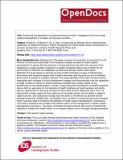| dc.contributor.author | Zhang, Xiulan | |
| dc.contributor.author | Bloom, Gerald | |
| dc.contributor.author | Xu, Xiaoxin | |
| dc.contributor.author | Chen, Lin | |
| dc.contributor.author | Liang, Xiaoyun | |
| dc.contributor.author | Wolcott, Sara J | |
| dc.coverage.spatial | China | en_GB |
| dc.date.accessioned | 2014-12-10T14:35:56Z | |
| dc.date.available | 2014-12-10T14:35:56Z | |
| dc.date.issued | 2014-08-26 | |
| dc.identifier.citation | Zhang XL, G Bloom, X Xu, L Chen, X Liang and SJ Wolcott (2014) Advancing the application of systems thinking in health: managing rural China health system development in complex and dynamic contexts. Health Research Policy and Systems 2014, 12:44 doi:10.1186/1478-4505-12-44 | en_GB |
| dc.identifier.issn | 1478-4505 | |
| dc.identifier.uri | https://opendocs.ids.ac.uk/opendocs/handle/20.500.12413/5430 | |
| dc.description.abstract | Background: This paper explores the evolution of schemes for rural finance in China as a case study of the long and complex process of health system development. It argues that the evolution of these schemes has been the outcome of the response of a large number of agents to a rapidly changing context and of efforts by the government to influence this adaptation process and achieve public health goals.
Methods:The study draws on several sources of data including a review of official policy documents and academic papers and in-depth interviews with key policy actors at national level and at a sample of localities.
Results: The study identifies three major transition points associated with changes in broad development strategy and demonstrates how the adaptation of large numbers of actors to these contextual changes had a major impact on the performance of the health system. Further, it documents how the Ministry of Health viewed its role as both an advocate for the interests of health facilities and health workers and as the agency responsible for ensuring that government health system objectives were met. It is argued that a major reason for the resilience of the health system and its ability to adapt to rapid economic and institutional change was the ability of the Ministry to provide overall strategy leadership. Additionally, it postulates that a number of interest groups have emerged, which now also seek to influence the pathway of health system development.
Conclusions: This history illustrates the complex and political nature of the management of health system development and reform. The paper concludes that governments will need to increase their capacity to analyze the health sector as a complex system and to manage change processes. | en_GB |
| dc.description.sponsorship | UKaid: DFID | en_GB |
| dc.language.iso | en | en_GB |
| dc.publisher | Springer | en_GB |
| dc.rights.uri | http://creativecommons.org/licenses/by/3.0/ | en_GB |
| dc.subject | Health | en_GB |
| dc.title | Advancing the application of systems thinking in health: managing rural China health system development in complex and dynamic contexts | en_GB |
| dc.type | Article | en_GB |
| dc.rights.holder | © 2014 Zhang et al.; licensee BioMed Central Ltd. | en_GB |
| dc.identifier.externaluri | http://www.health-policy-systems.com/content/12/1/44 | en_GB |


